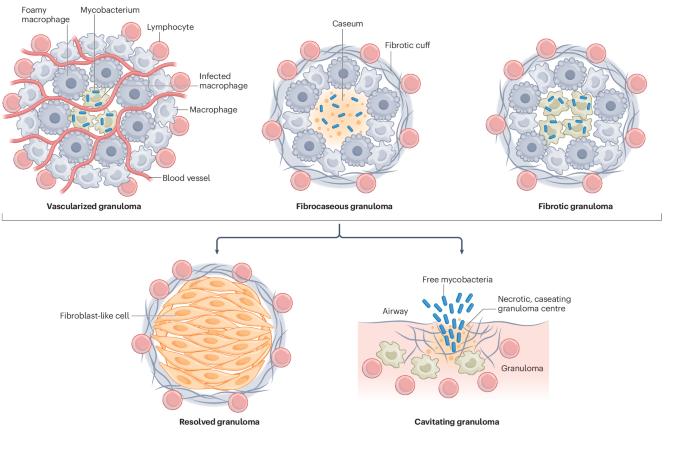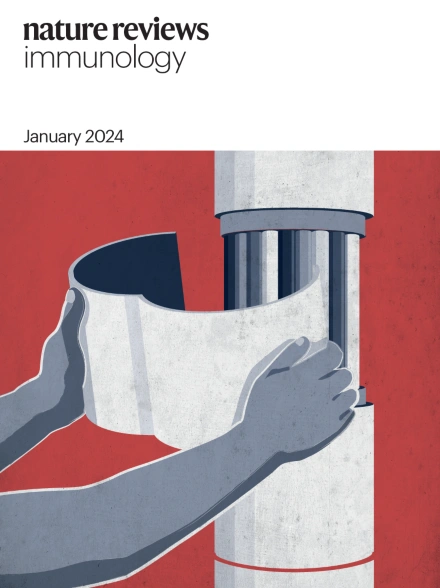How macrophage heterogeneity affects tuberculosis disease and therapy
IF 60.9
1区 医学
Q1 IMMUNOLOGY
引用次数: 0
Abstract
Macrophages are the primary host cell type for infection by Mycobacterium tuberculosis in vivo. Macrophages are also key immune effector cells that mediate the control of bacterial growth. However, the specific macrophage phenotypes that are required for optimal immune control of M. tuberculosis infection in vivo remain poorly defined. There are two distinct macrophage lineages in the lung, comprising embryonically derived, tissue-resident alveolar macrophages and recruited, blood monocyte-derived interstitial macrophages. Recent studies have shown that these lineages respond divergently to similar immune environments within the tuberculosis granuloma. Here, we discuss how the differing responses of macrophage lineages might affect the control or progression of tuberculosis disease. We suggest that the ability to reprogramme macrophage responses appropriately, through immunological or chemotherapeutic routes, could help to optimize vaccines and drug regimens for tuberculosis. This Perspective discusses current knowledge of the diverse roles played by different macrophage populations within the Mycobacterium tuberculosis-infected lung. The underlying hypothesis is that disease outcome depends on macrophage ontogeny and epigenetic programming, in addition to the immune environment.


巨噬细胞异质性如何影响结核病及其治疗
巨噬细胞是体内结核分枝杆菌感染的主要宿主细胞类型。巨噬细胞也是介导细菌生长控制的关键免疫效应细胞。然而,在体内对结核分枝杆菌感染进行最佳免疫控制所需的特定巨噬细胞表型仍然不清楚。肺中有两种不同的巨噬细胞谱系,包括胚胎来源的组织内肺泡巨噬细胞和募集的血液单核细胞来源的间质巨噬细胞。最近的研究表明,这些谱系对结核肉芽肿内相似的免疫环境有不同的反应。在这里,我们讨论巨噬细胞谱系的不同反应如何影响结核病的控制或进展。我们认为,通过免疫或化疗途径适当地重新编程巨噬细胞反应的能力,可能有助于优化结核病的疫苗和药物方案。
本文章由计算机程序翻译,如有差异,请以英文原文为准。
求助全文
约1分钟内获得全文
求助全文
来源期刊

Nature Reviews Immunology
医学-免疫学
CiteScore
93.40
自引率
0.40%
发文量
131
审稿时长
6-12 weeks
期刊介绍:
Nature Reviews Immunology is a journal that provides comprehensive coverage of all areas of immunology, including fundamental mechanisms and applied aspects. It has two international standard serial numbers (ISSN): 1474-1733 for print and 1474-1741 for online. In addition to review articles, the journal also features recent developments and new primary papers in the field, as well as reflections on influential people, papers, and events in the development of immunology. The subjects covered by Nature Reviews Immunology include allergy and asthma, autoimmunity, antigen processing and presentation, apoptosis and cell death, chemokines and chemokine receptors, cytokines and cytokine receptors, development and function of cells of the immune system, haematopoiesis, infection and immunity, immunotherapy, innate immunity, mucosal immunology and the microbiota, regulation of the immune response, signalling in the immune system, transplantation, tumour immunology and immunotherapy, and vaccine development.
 求助内容:
求助内容: 应助结果提醒方式:
应助结果提醒方式:


